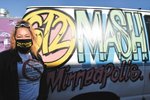
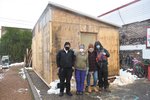
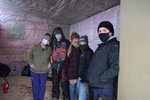
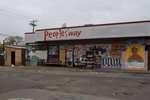
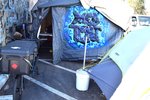
When Kia Bible went to 38th St. and Chicago Ave. four days after George Floyd was killed by Minneapolis police, she had no idea she was about to be called into service. Moved by her 12-year-old daughter, who had asked how she’s supposed to explain to her grandkids one day what was happening, Bible had spent the previous two days with her kids showing them – by going to protests and then volunteering in North Minneapolis to distribute supplies and helping with cleanup along E. Lake St.
Exhausted, Bible was ready for a break when the memorial site somehow caught her attention. Within moments they headed over, stopping first to see her Uncle Bob at 37th St. and Columbus Ave., where she had spent most of her adolescence. Her uncle told her to check out the white bus parked at the intersection – and his idea to create a medical bus. Intrigued, Bible said she’d try to find EMS personnel, but first she was going to grab some chicken that another uncle was preparing for the community in what would come to be known as George Floyd Square.
Call it serendipity or call it divine, as Bible does, before she could even eat her meal, she spotted two women with red crosses on their shoulders (indicating they were medics) and shared the idea. They messaged an online forum, and the very next day volunteers began showing up.
“Little did I know on May 29 I was going to become a full-time activist,” said Bible, laughing.
Meantime, Kimberly Wooster had been working as a street medic at area demonstrations, first at the protest on Hennepin Ave., where the group of physicians and nurses she was with got hit with rubber bullets, tear gas and mace, and next at the Kmart on Nicollet Ave., where she encountered similar actions. She told her husband she needed to take a few days away from the protests “just ‘cause my body was hurtin’” but stopped by the memorial to do some basic medic work. As she was leaving, she went to drop off a donated pop-up tent. There, she met Bible.
Wooster returned the next day, and neither she nor Bible have slowed down since.
Bringing care to the community
Donations began pouring in – canopy tents, medical supplies, inhalers, Benadryl. The bus became a space for storage as well as a place for volunteers to rest, and care moved into adjacent tents. With so many people visiting the memorial at the time, needs were high. Medics provided water and treated heat exhaustion and sunburn, as well as patients going into anaphylactic shock and other serious trauma cases. One such case, Bible described, was a person whose girlfriend tried to chop his arm off with a machete that had become heavily infected.
“If he didn’t go into a doctor that day or the next day, it was quite possible that he would lose his arm,” said Bible.
Word quickly spread of the med tent, which for many people was – and still is - the most accessible place to get care. In addition to providing services to residents and visitors to the Square, they began receiving calls from surrounding neighborhoods requesting help. If it was a trusted source, they would go outside the barricades to answer the call. People also found the med tent on their own. In one instance, a gentleman was literally pedaling for his life when he rode his bike into the Square with two gunshot wounds, calling for help.
“The second we got him off his bicycle, I think his body realized, like, ‘Okay, I’m gonna let somebody else take over,’ ‘cause he just fell,” said Wooster. He was bleeding from his carotid artery. The medics were able to plug up the wound, and as they did so they discovered a second wound. Their goal was to buy the patient some time until the paramedics arrived. But after calling 911, they were met first by what Bible estimated to be about 10-12 police officers and 5-7 National Guard officers, all heavily armed.
“It was terrifying, because they jumped out loaded for bear. Two of ‘em had assault rifles. They were extremely hostile,” said Wooster. “There was no kind of professional courtesy at all, and they were trying to interrogate people as they were treating.” Wooster believes it wasn’t until after the paramedics got there that the officers realized they were a medical unit, but Wooster said they “straight up interrogated us like we did it to him.”
Meantime, the bus, which was parked from one side of Chicago Ave. across to the other, served as a barricade.
“We built a wall of people at the bus to keep people back. Tensions were high,” said Bible. She defused a confrontation between a protector and an officer by putting a hand on his shoulder and telling him to “stand down.” He was one of the 40 or so community protectors who were also operating under Bible’s direction.
Bible recalled when Dr. Jackie Kawiecki, who had arrived a couple days after Bible began taking volunteers, told her she looked like she was swimming under water. Bible had replied, “I am. I’m kicking from the bottom of the ocean and shooting for a star, and I’ll be damned if I don’t get one.”
What was meant to be about a five-hour volunteer shift for “Dr. K” became 50 straight days, and together Dr. Kawiecki and Bible cofounded 612 M*A*S*H.
“We used to joke, like, ‘Oh, we’re working out of a MASH unit out here,’” said Bible. They used 612 then changed the meaning of the acronym MASH, from Mobile Army Surgical Hospital to Minneapolis All Shall Heal. “We weren’t a surgical unit. But we are in the center of Minneapolis, and we’re hopeful that what we do provides a tangible way for all of us to be able to heal.”
Shifting needs
For the first couple of months, they operated nonstop, with about 30-60 people in their crew. Now, they’ve got a handful of core team members and about 10 on support staff. All are volunteers. The tempo has shifted, and so have the needs of the community. Pre-July 4th, as Wooster described, they were managing more emergent issues, which still happen, but further apart. And now people come for follow-up and primary care.
Bible mentioned a gentleman on dialysis who has sores on his legs that often seep, which could get easily infected. Though a nurse checks in on him weekly, he still checks in at the med tent just to make sure it’s looking good.
“Anything we can do that obeys our scope of practice in your follow-up, we’re happy to do for free,” said Wooster. She later emphasized that 612 MASH is available to treat anyone who walks in. “Your circumstances as to how you got injured are unimportant to me – and should be unimportant to any medical professional.”
Asked why people choose to come to the med tent rather than go elsewhere, Bible was quick to respond: “Because we’re genuine. The people here are absolutely here to do the work. They wanna be here,” she said. “To come out here and give unconditionally everything you can possibly give, you can’t explain that feeling that you get when you’re around somebody that genuinely cares.”
Leading by example
Fittingly, Bible has been nicknamed “Mama” by her crew. Between her godkids, stepkids and biological kids, she calls 17 young people her kids, in whose lives she plays an active role. Just as she walked with her daughter into the uprising and the fight for Black liberation, she’s taught and mentored people in the Square. While developing the medical unit, she was also leading the community protection crew who helped keep eyes and ears on the site. Though there’s new on-site security now, many of these original protectors still drop in to check on medical.
612 MASH was also the epicenter of the Square, where for a time everyone was coming to Bible for answers. She made the rounds getting to know as many people with boots on the ground as possible to make needed connections. All while juggling her personal and professional roles.
“It’s kind of hard for myself to separate the two, from being just a Black woman and fighting for liberty in the community that I grew up in and being a cofounder of a nonprofit organization that is gonna provide medical to this space on a genuine level,” she said. She’s finding that balance.
Moving forward
On Oct. 7, a fire destroyed the med tent. As is the modus operandi within the George Floyd Square community, a call for help immediately brought people with shovels, brooms, bodies and hands to help tear it down and clean it up. It also bumped up the timeline to build their new winterized space, which was already being discussed. Mostly, though, “It lit a fire under our butts to remind ourselves that we do not have a choice other than just to simply do the work,” said Bible. “That’s what we’re here to do, and we’re gonna continue to do it. It’s that simple.”
Looking ahead, 612 MASH plans to serve as a mobile unit at encampments, rallies and in underserved communities. Their mission is to bridge the gaps in health care that disproportionately impact BIPOC communities while creating meaningful educational opportunities (see sidebar). Wooster said that once justice is served, they may stay until the gaps are closed and they feel the community is safe, then bring the operation to other neighborhoods in North and South Minneapolis.
To lend a hand
612 MASH needs volunteers. They’re looking for nurses and anyone with EMT-B, EMT-A and/or paramedic certification. They also need physicians who can lend their insight and experiences by serving on the Board of Directors of 612 MASH, a 501c3 nonprofit organization.
Donations, including monetary, are greatly appreciated (Cashapp: $612MASH, Venmo: @medicalbus).
Find 612 MASH on Facebook @MinneapolisAllShallHeal
Comments
No comments on this item Please log in to comment by clicking here